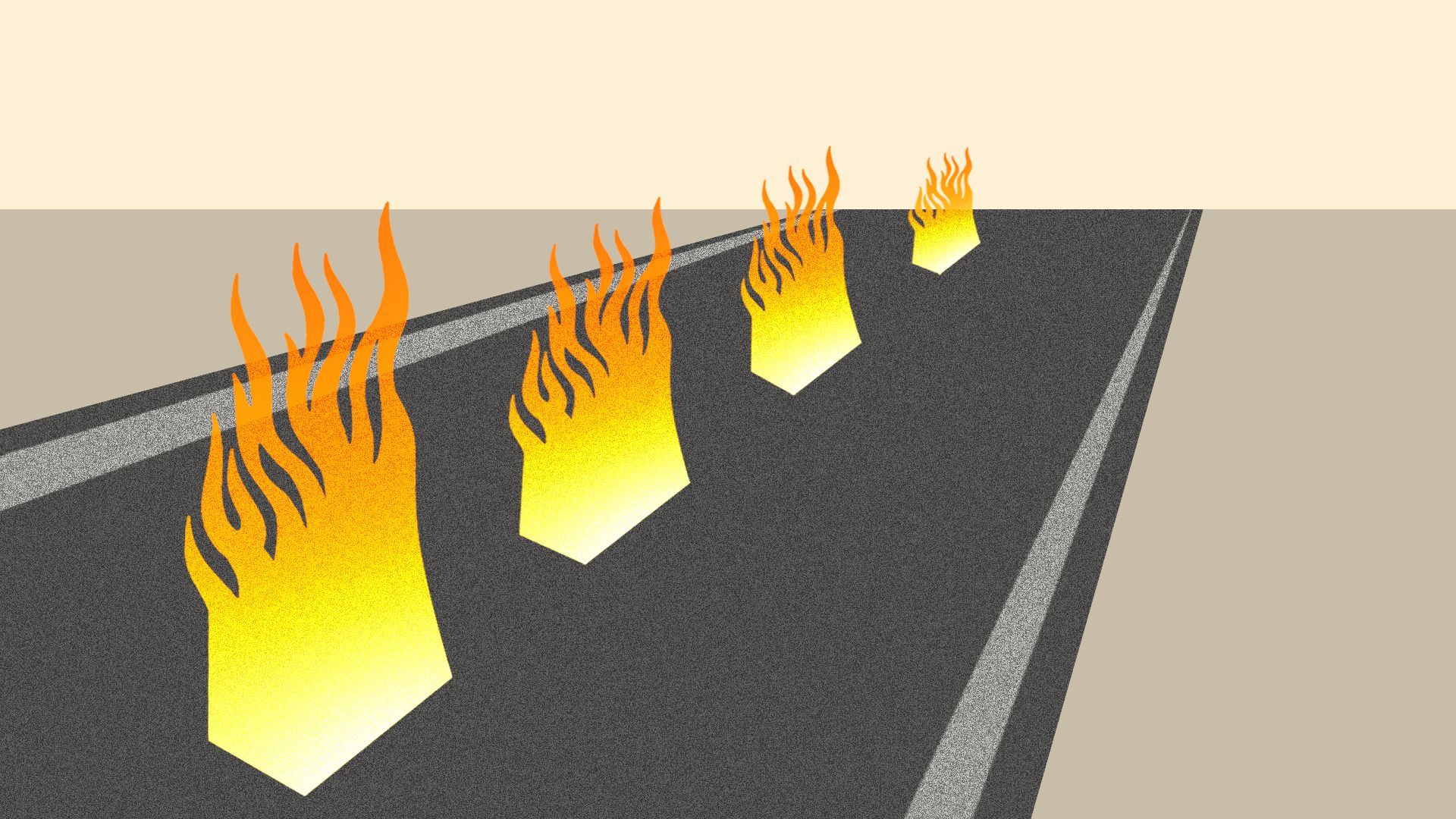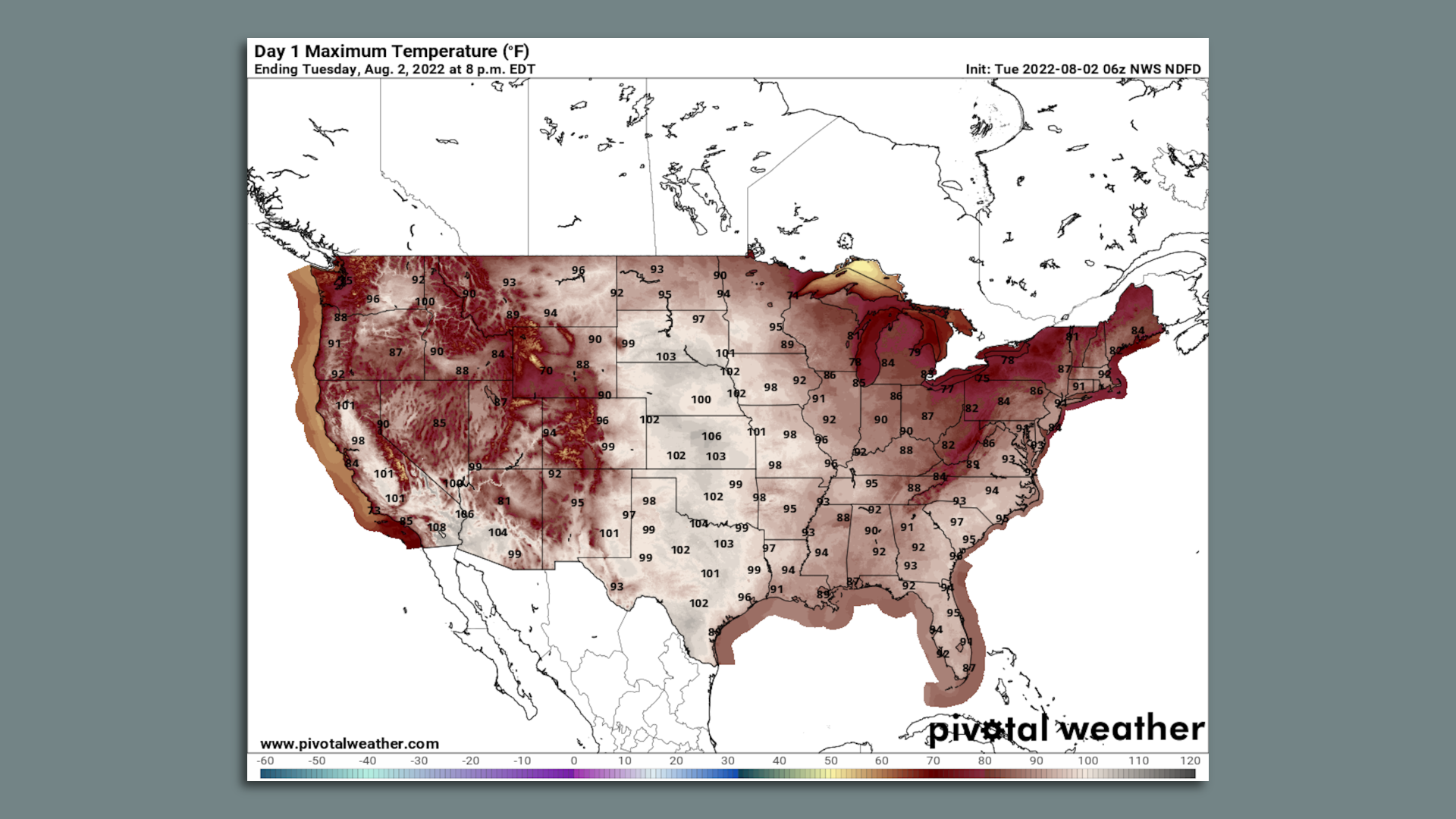| | | | | | | Presented By Build Nuclear Now: A project of the Breakthrough Institute & Third Way | | | | Axios Generate | | By Ben Geman and Andrew Freedman · Aug 02, 2022 | | ☕ Good morning! Today's newsletter, edited by Mickey Meece, has a Smart Brevity count of 1,262 words, 5 minutes. 📬 Did a friend send you this newsletter? Welcome, please sign up. 🎶 Today marks 35 years since conscience-rockers Midnight Oil released the album "Diesel and Dust," which provides today's searing intro tune... | | | | | | 1 big thing: One week in U.S. extreme weather |  | | | Illustration: Natalie Peeples/Axios | | | | Floods, heat waves and wildfires across the U.S. have killed dozens and reshaped entire communities from Kentucky to Northern California in the past week alone, Andrew writes. Why it matters: This summer has demonstrated repeatedly that our infrastructure is not able to withstand the changed climate of today, let alone future impacts. Driving the news: Two 1-in-1,000-year rainstorms that struck communities about 400 miles apart in St. Louis and Hazard, Kentucky. - In St. Louis, rainfall rates overwhelmed drainage systems and caused rivers and creeks to overflow, washing out roadways and forcing swift water rescues to be conducted.
- In Kentucky, water moved so forcefully that it pulverized school buses, washed mobile homes away, and destroyed roads and bridges, killing at least 37.
In the Pacific Northwest, a record-breaking heat wave struck that lasted longer than the 2021 extreme event. And in California, the week also brought a deadly wildfire that stunned scientists due to its growth rate and extreme behavior. The big picture: With climate change, outlier events are trending closer to the norm, exceeding our ability to cope. - "Years of wearing down from weather events have left our built environment incapable of withstanding heavier precipitation on a per event basis," said Steven Bowen, head of catastrophe insight at Aon, via email.
- "One thing is clear: The modeled climate impacts we assumed were 25 to 50 years away are in some cases already occurring today," Bowen said.
- The White House seems to recognize these challenges, with funds under the bipartisan infrastructure law directed at hardening infrastructure.
Yes, but: There is a chance that even now we are underestimating what Mother Nature is capable of due to human-caused climate change. Read more. |     | | | | | | Bonus: 30 million under heat warnings today |  | | | Forecast high temperatures from the National Weather Service for Aug. 2. (Pivotal Weather) | | | | About 30 million are under heat warnings and advisories today, from the Twin Cities to North Texas, as a heat dome intensifies across the central U.S. and sprawls to cover nearly half the Lower 48 states, Andrew writes. Threat level: Heat indices in the warned regions will soar to dangerous levels of up to 110°F as air temperatures reach the upper 90s to low 100s. - Temperatures in the 90s and 100s will extend from Texas to the Canadian border today.
- The heat then shifts east, affecting tens of millions more by mid-to-late week as the heat dome sets up across the Ohio Valley and Mid-Atlantic.
- Climate change makes heat waves more likely to occur, more intense, and longer-lasting.
|     | | | | | | 2. Where the big climate bill stands |  | | | Photo illustration: Sarah Grillo/Axios. Photos: Stefani Reynolds-Pool, Alex Edelman/AFP via Getty Images | | | | Here's the latest on the fragile Democratic deal to massively expand clean energy investments, Ben writes. 🤝 Joe Manchin's side deal takes shape. His office circulated an outline of his agreement with Democratic leaders to speed permitting in exchange for backing the big climate bill. - Why it matters: The permitting plan would make it easier to build all kinds of projects — including fossil fuel infrastructure like pipelines but also renewables and critical minerals development.
- The intrigue: It would specifically approve the Mountain Valley Pipeline, a major — and contested — natural gas project in Manchin's home state of West Virginia.
- What we don't know: Whether the permitting bill will pass. It would require GOP help because, unlike the climate bill, it can't move under the complex "reconciliation" process that's immune from filibustering. The Washington Post notes some Democrats could defect over making new oil projects easier.
📊 Moody's makes the case. Here's an interesting point in Moody's Analytics wider analysis of the climate bill: They argue it "mitigates the economic cost of inaction." - They project that compared to a case with no additional climate policies, real GDP is 0.6% higher in 2050 and 2.7% higher by 2100.
- "The clear lesson is that upfront investments in addressing climate change reap substantial long-term economic benefits."
🥵 Sinema under pressure. Corporate America has launched a two-pronged, 11th-hour assault on Democrats' reconciliation package by targeting Sen. Kyrsten Sinema (D-Ariz.), the one person that big business hopes can stop — or modify — the $740 billion bill, Axios' Hans Nichols reports. |     | | | | | | A message from Build Nuclear Now: A project of the Breakthrough Institute & Third Way | | License advanced nuclear reactors now | | |  | | | | Clean, secure, homegrown, advanced nuclear energy is the safe, zero-carbon energy solution that America needs — but time is running out. America's policies must support this technology, or we risk falling behind as a global leader in nuclear energy. Find out more. | | | | | | 3. First look: Proving up a zero-carbon grid |  | | | Illustration: Annelise Capossela/Axios | | | | The Energy Department unveiled a program today that will finance demo projects aimed at showing how grids can reliably operate on a mix of renewables, storage and other distributed resources, Ben writes. - "Americans do not have to choose between a clean grid and a reliable one," Energy Secretary Jennifer Granholm said in a statement.
Why it matters: The White House has a target of achieving 100% zero-carbon power by 2035, but that would require sweeping transformations even as renewables and storage are steadily gaining ground today. How it works: Per DOE, the funding through the bipartisan infrastructure law will support up to 10 projects. - The department says that as the grid mix evolves, operators need "new tools to manage this increasingly complex network" and respond to cyberattacks and extreme weather.
- The projects will also aim to show "how a clean energy grid prevents blackouts by quickly identifying and responding to faults."
The intrigue: The plan to solicit funding applications arrives amid a growing corporate and public policy effort to pioneer round-the-clock sourcing of zero-carbon electricity. While some companies and local governments aim to match annual demand with clean power, it still means pulling from grids with fossil fuels. Andrew contributed reporting. |     | | | | | | 4. 🛢️Catch up fast on oil: profits, prices, sanctions | | 💰BP reported an $8.45 billion Q2 profit this morning, its highest in 14 years, closing out a huge earnings season for Europe- and U.S.-based majors reaping benefits of the commodity price surge, Ben writes. - Driving the news: The company announced a 10% dividend increase and another $3.5 billion worth of share buybacks.
- The intrigue: The FT notes that massive Q2 hauls from BP, Shell, Exxon and others are "likely to spark renewed calls in some countries for another round of tax increases on the sector."
⛽ Average U.S. gasoline prices have fallen under $4.20 per gallon as they continue falling steeply from the peak of over $5 per gallon in mid-June, per AAA data. ⚔️ The U.S. unveiled a fresh spate of sanctions against six entities that have facilitated the international sale of Iranian petroleum and petrochemical products, Axios' Ivana Saric reports. |     | | | | | | 5. Charted: Renewables spending proves resilient |  Data: BloombergNEF; Chart: Erin Davis/Axios Visuals Global renewable energy investment had its strongest first half on record, per just-released analysis from the research firm BloombergNEF, Ben writes. The big picture: Total investment hit $226 billion in the first six months, up 11% from the same stretch last year but a decline from the second half. - China was again the largest overall market, accounting for $98 billion of the $226 billion total.
- Investments in "large-scale" projects were 12% higher than in the same period in 2021.
- Combined large- and small-scale solar finance hit a record-breaking $120 billion, while offshore wind finance also surged.
- VC and private equity funding hit record levels, but that's a small slice of the total pie. But public markets finance by larger players declined.
Yes, but: On a worldwide basis, renewables are not yet replacing fossil fuels on a mass scale as overall global energy demand rises. Global coal demand is slated to match its prior 2013 peak in 2022 and is projected to rise again next year, the International Energy Agency said in a report last week. |     | | | | | | A message from Build Nuclear Now: A project of the Breakthrough Institute & Third Way | | License advanced nuclear reactors now | | |  | | | | Clean, secure, homegrown, advanced nuclear energy is the safe, zero-carbon energy solution that America needs — but time is running out. America's policies must support this technology, or we risk falling behind as a global leader in nuclear energy. Find out more. | | | | 🙏Thanks for reading and see you back here tomorrow. |  | | Why stop here? Let's go Pro. | | | | | | Axios thanks our partners for supporting our newsletters. If you're interested in advertising, learn more here.
Sponsorship has no influence on editorial content. Axios, 3100 Clarendon Blvd, Arlington VA 22201 | | | You received this email because you signed up for newsletters from Axios.
Change your preferences or unsubscribe here. | | | Was this email forwarded to you?
Sign up now to get Axios in your inbox. | | | | Follow Axios on social media:    | | | | | |









No comments:
Post a Comment